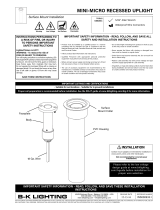
INSTALLATION INSTRUCTIONS
Inground & Well Lights
Architectural Series
1141
1625 Surveyor Avenue • Simi Valley, CA 93063 • (805) 527-0987 • (800) 766-VISTA (8478)
Vista Professional Outdoor Lighting reserves the right to modify the design and/or construction of the fixture shown without further notification.
INSTRUCTIONS FOR SEALING WIRING COMPARTMENT
Note: Failure to properly wire and encapsulate wiring compartment
will void product warranty.
8. After properly wiring the Supply and Load Conductors, position the
Silicone filled Wire Nuts at the bottom of the Junction Box.
9. Use Duct Seal around the opening of the conduit entry and the Supply
Wires to seal off the conduit opening.
10. Fill the inside of the Junction Box to cover the Duct Seal but no more
than to the top of the inside hub with re-enterable potting sealant.
DO NOT OVERFILL OR UNDERFILL!
11. To properly mix the re-enterable potting sealant, remove the pouch
from the protective cover. Grasp both sides of the sealant pouch, breaking
the internal barrier between parts A&B.
12. Mix the sealant by kneading the two sides back and forth until
thoroughly
mixed.
13. Cut a corner off of the pouch and pour into the inside of the Junction
Box,
completely covering the Silicon filled wire nuts. Allow the sealant to dry for
approximately 20 minutes or until compound has gelled.
14. Re-install the Junction box Cover, making sure it is fully tightened until
the lid bottoms out on the inside of the RIS.
15. Position the LINEAR LED Module into the RIS and snap in place.
16. Supply power to the luminaire and check for proper operation.
1141 10.19.21
LINEAR LED MODULE AND J-BOX COVER INSTALLATION:
1.To prevent electrical shock, turn main power off at the circuit breaker.
2.Remove temporary cover plate with vinyl label. Recycle or discard cover
plate.
3.Remove and retain Junction Box Cover and Cover Screws.
4.Route the free end of the LINEAR LED Module Load Conductor Cable
through the top side of J-Box Cord Seal and out the back side of the
J-Box Cover.
5.Using the appropriate size open end wrench or Crescent wrench, firmly
tighten the top nut of the J-Box Cord Seal such that the outer jacket of the
LINEAR LED Module Load Conductor Cable extends past the back side of
the J-Box Cover a distance of 1” to 2”. Set the LINEAR LED Module with
the attached J-Box Cover aside.
6.Pull the Supply Conductor wire loop out of the J-Box, cut at center and
strip the leads.
7.Using the Silicone Filled Wire Nuts (provided), connect the Supply
Conductors in the Junction-Box to the Load Conductors of the LINEAR
LED Module noting the following polarity:
Supply (+) to Load (Black)
Supply (-) to Load (White)
Supply (Ground) to Load (Green)
If 0-10V dimming is used:
Dimming Supply (+) to Dimming Load (Red)
Dimming Supply (-) to Dimming Load (Orange)
LINEAR OPTIC
MODULE
RETAINING
CLIPS
COVER
SCREWS
JUNCTION
BOX COVER
SUPPLY
CONDUIT
JUNCTION
BOX
REBAR
REBAR
BRACKET
ROUGH-IN
SECTION
LOAD CONDUCTOR
CABLE
JUNCTION BOX
CORD SEAL
TEMP COVER/OPTIC MODULE ACCESS
EXPLODED VIEW
CABLE GRIP
LOAD
CONDUCTORS
JUNCTION
BOX
RE-ENTERABLE
POTTING SEALANT
SILICON FILLED
WIRE NUTS
SUPPLY
CONDUCTORS
CONDUIT
DUCT SEAL
LOAD
CONDUCTOR
CABLE












